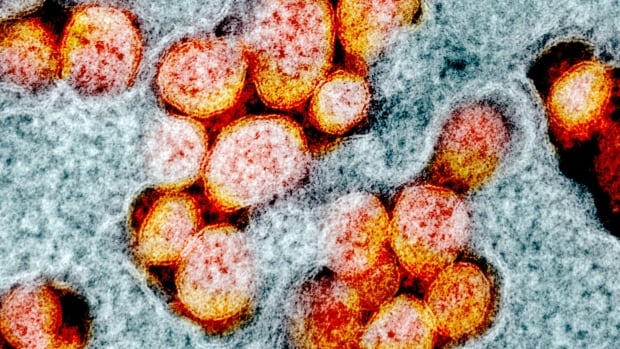Public Health is reporting 90 new cases of COVID-19 in New Brunswick on Sunday.
There are also 43 recoveries, bringing the total number of active cases to 640.
The breakdown of the new cases is:
Zone 1, Moncton region, 22 cases:
- four people 19 and under.
- four people 20-29.
- five people 30-39.
- two people 40-49.
- three people 50-59.
- two people 60-69.
- a person 70-79.
- a person 80-89.
Four cases are contacts of previously known cases and 18 are under investigation.
Zone 2, Saint John region, 13 cases:
- four people 19 and under.
- two people 20-29.
- two people 30-39.
- two people 40-49.
- a person 50-59.
- two people 70-79.
Three cases are contacts of previously known cases and 10 are under investigation.
Zone 3, Fredericton region, 23 cases:
- two people 19 and under.
- a person 20-29.
- six people 30-39.
- six people 40-49.
- four people 50-59.
- two people 60-69.
- two people 70-79.
Five cases are contacts of previously known cases and 18 are under investigation.
Zone 4, Edmundston region, 2 cases:
- a person 20-29.
- a person 30-39.
Both cases are under investigation
Zone 6, Bathurst region, 1 case:
- an individual 40-49.
The case is a contact of a previously known case.
Zone 7, Miramichi region, 29 cases:
- four people 19 and under.
- 10 people 20-29.
- six people 30-39.
- two people 40-49.
- a person 50-59.
- three people 60-69.
- three people 70-79.
Nine cases are contacts of previously known cases and 20 are under investigation.
There are 32 people hospitalized because of COVID-19, including 18 in intensive care units.
Dorchester outbreak
One prisoner advocate said she believes an outbreak at Dorchester Penitentiary is reflective of COVID-19 cases in the province as a whole and not of the situation inside prisons.
On Friday, Correctional Services Canada confirmed 37 cases at the prison, 34 among inmates and three among staff.
There have been no further updates from the prison.
Catherine Latimer, the executive director of the John Howard Society of Canada, said by definition prisons are controlled environments where theoretically there shouldn’t be outbreaks occurring because of inmates.
Rather, any outbreaks would have to be related to people from the outside coming in.
“I think it’s very important to take a look at the contact tracing and find out what exactly happened,” said Latimer.
“Prisons are closed institutions, prisoners can’t give it to each other. They have to be getting it from the outside.”
She said once the virus enters a prison it can spread quickly because physical distancing isn’t possible.
Latimer is surprised by the number of cases, given that nearly 86 per cent of inmates in the medium-level security unit are fully vaccinated, and more than 88 per cent have received their first dose.
“[It’s] a good clue [that] you need to really reinforce your prevention efforts. And maybe hold up a little bit on visitors and people who have not been double vaccinated coming into the prisons when your community has a big outbreak.”
Public exposure notices
Public Health is also reporting new potential public exposures in three zones.
Zone 3
- Nov. 17 between 1:30 p.m. and 3:30 p.m. – Dairy Queen (277 Connell St., Woodstock)
Zone 4
- Nov. 16 between 11:30 a.m. and 1:30 p.m. – Pizza Delight/Scores (462 Madawaska Rd., Grand Falls)
Zone 7
- Nov. 16 – Xtreme Fitness (60 William Gay St., Neguac)
- Nov. 11, 12, 13, 14, 15 and 16 between 7 a.m. to 8 a.m. – Chez Raymond (486 Rue Principale Neguac)
For the full list of new and previous public exposure notices, please visit the provincial government’s website.
People who have not been fully vaccinated at least 14 days prior to a possible exposure and who have symptoms should get a COVID lab test. They can book an appointment online or call Tele-Care 811 and must isolate while waiting for their test result.
People who are not fully vaccinated and do not have symptoms are now being instructed to pick up an At-Home COVID-19 Rapid Point of Care Test (Rapid POCT) screening kit. They do not need to isolate if they have not been directed by Public Health to do so.
All positive point-of-care test results must be confirmed with a laboratory polymerase chain reaction, or PCR, test.
It can take up to 14 days to test positive after being exposed to COVID-19, so even if results come back negative, people should continue to self-monitor for any symptoms and get tested immediately if any develop.
They should also avoid visiting settings with vulnerable populations, such as nursing homes, correctional facilities and shelters during that 14-day period.
For people who have been fully vaccinated at least 14 days prior to a possible exposure, Public Health recommends they monitor for symptoms for 14 days after the possible exposure and get a COVID lab test if symptoms develop.
They do not need to isolate while they wait for their test results.
If they do not have symptoms, they can pick up a rapid test kit and do not need to isolate.
What to do if you have a symptom
People concerned they might have COVID-19 can take a self-assessment test online.
Public Health says symptoms of the illness have included a fever above 38 C, a new or worsening cough, sore throat, runny nose, headache, a new onset of fatigue, and difficulty breathing.
In children, symptoms have also included purple markings on the fingers and toes.
People with one of those symptoms should stay at home, call 811 or their doctor and follow instructions.








